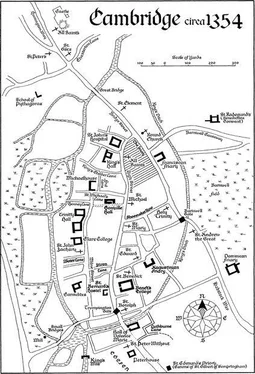Bartholomew shrugged. ‘There was enough light for me to see that there was a serious wound to the head that would have killed him had he been alive when it was inflicted. It was also light enough for me to tell that his neck had been broken.’
‘So?’ asked Michael. ‘Are you saying that someone hit him on the head so hard that it broke his neck?’
‘Lord, no!’ said Bartholomew with a shudder. ‘At least, I sincerely hope not. That kind of strength would mean that we have some kind of monster on the loose.’
‘What then?’ asked Michael impatiently. ‘That someone broke his neck and he damaged his head when he fell to the ground?’
‘I cannot tell. And then, of course, there was his weak heart. I have been physicking him over several months for that complaint – and he was quite ill with it on Monday afternoon.’
‘But you must be able to tell how he died,’ pressed Michael, determined to have an answer. ‘And what about the tunnel? Did it collapse naturally? Or did someone tamper with it?’
‘I have no idea, although I cannot see that a body would be so firmly stuck just from someone pushing it inside.’
‘The body was swollen,’ suggested Michael. ‘Maybe it just got bigger, as corpses are wont to do after death – gasses, you once told me.’
‘It is possible, I suppose,’ said Bartholomew. ‘He has been missing for two days – since Monday evening – although the weather is cold, which tends to slow that sort of thing down. But if someone did use the tunnel as a hiding place, he did not do a very good job by leaving a foot sticking out. And if the tunnel were used fairly frequently, which was the impression I gained from Horneby and his friends, then it was not a very permanent hiding place, either.’
‘Perhaps it was not intended to be permanent. Perhaps it was intended to hide the body long enough until somewhere better could be found.’ Michael groaned suddenly. ‘What a mess, Matt! We do not know whether Kyrkeby was hit over the head, his neck broken, rammed down a hole that collapsed on him, or died naturally. And we do not even know when it happened.’
Bartholomew nodded. ‘But remember the position of the body? Kyrkeby appeared to be leaving the Carmelite Friary, not entering it.’
‘Then perhaps he was meeting someone there. But he was taking a risk if he were. It would have been safer to arrange a meeting outside both friaries, on neutral ground – for him and for the Carmelite with whom he had business.’
‘But that assumes that the person Kyrkeby was meeting knew Kyrkeby wanted to see him,’ said Bartholomew. ‘Perhaps he did not.’
Michael sighed and scrubbed hard at his temples with two forefingers that were flecked with oatcake crumbs. ‘I do not understand any of this, Matt.’
‘Nor me,’ admitted Bartholomew. ‘But I have the feeling that all the evidence we have gained so far has been very superficial and incidental, and that there is a lot more that we do not know.’
Michael agreed. ‘But tomorrow we will find out. We will tell the Dominicans what has become of their Precentor first thing in the morning, and then I will ask whether any of them knows anything about a missing essay on nominalism.’
The following morning, just as the first glimmerings of dawn lightened the sky, Bartholomew dragged himself from a deep sleep, and washed and shaved in the dim light, muttering under his breath when he could not find a clean shirt. Michael tapped on the door and they walked into the courtyard together, ready to process to the church for the morning mass. The other scholars had barely started to assemble when Brother Timothy arrived, breathless and white-faced. Michael regarded his Junior Proctor uneasily, anticipating more bad news, but it was not Michael that Timothy wanted: he had been sent to fetch Bartholomew, because old Brother Adam was having trouble catching his breath. The physician grabbed his bag and set off at a run with Michael following at a rather more sedate pace.
It was raining steadily, and the High Street was little more than a river of thin, splashy mud. Those who were early risers looked cold and miserable as they trudged along, and seemed to be wearing clothes that had dulled to a shade of drab brown in the wet semi-darkness. Even the animals that were being herded to the Market Square were dirty and bedraggled. Roofs released thin trickles of filthy water into the streets below, and the plaster-fronted houses were grey with damp.
They reached Ely Hall, and Timothy shoved open the front door to precede them along the narrow corridor and up the stairs to the upper floor. What had once been a single large chamber had been divided into six small rooms to afford the Benedictines some privacy. Timothy had a chamber that overlooked a vile little yard at the back, while Janius and Adam had been allocated ones at the front with windows that boasted a view of the Market Square.
‘Thank God you are here,’ said Janius, crossing himself vigorously when he saw Bartholomew. ‘We were beginning to fear that you would be too late. We have been praying hard, but God has not performed a miracle yet.’
Bartholomew pushed past him to where Brother Adam lay wheezing and gasping on his bed. The old man’s face was grey, and his eyes indicated that he was very frightened. The room was stifling hot from the fire that blazed in the hearth, so the physician ordered the window opened. Then he helped Adam to sit and asked Timothy for a bowl of boiling water. While he waited, he gave Adam a small dose of poppy syrup to calm him, then a larger dose of lungwort in wine to ease the congestion. When the hot water arrived, he scattered myrrh into it and talked calmly while the old man inhaled the vapours with a cloth over his head.
After a while, Adam’s breathlessness eased and colour began to creep back into his cheeks. The monks who had clustered around the door heaved a sigh of relief, and Janius began to recite a prayer of thanksgiving in a loud, braying voice. He glared at his brethren until they joined in.
‘Thank you,’ said Adam softly, leaning back against his cushions and smiling weakly at Bartholomew. ‘This happens from time to time, especially when I go out.’
‘Why did you go out?’ asked Bartholomew. ‘I recommended that you remain indoors, at least until the weather improves.’
‘At dawn today I felt like a stroll in the Market Square,’ replied Adam. ‘And in December I attended a meeting at St Radegund’s Convent. Other than that, I have obeyed your instructions to the letter.’
‘ You were at the gatherings called by Walcote?’ asked Michael in astonishment, crouching next to the bed so that he could hear Adam above the strident prayers emanating from the corridor.
Adam nodded. ‘It was unpleasant walking there so late at night, and I was so ill afterwards that I told Walcote I would not attend any more. It was not a very interesting meeting, anyway.’
‘Why did you go?’ asked Michael. ‘Why not one of the others?’
‘Walcote invited me specifically, because I am Ely Hall’s senior Benedictine,’ said Adam. ‘I was going to suggest that Janius or Timothy went in my place, but the meeting was a waste of time, as it happened. We did nothing but talk about how to repair the Great Bridge and how to suppress the ideas of the realists. I do not hold with realism personally, but I do not like the notion of censoring theories and thoughts. It is a dangerous path to tread.’
‘Who else was there?’ demanded Michael.
‘Will Walcote and Prior Ralph represented the Austin canons, while Prior Morden put in an appearance for the Dominicans.’
‘The Austins and the Dominicans,’ said Michael in an undertone to Bartholomew. ‘That is new information. Matilde and Eve Wasteneys told us about the Carmelites, Franciscans and Gilbertines. If Adam is right, then virtually every Order in Cambridge was represented at Walcote’s nasty little covens.’
Читать дальше












